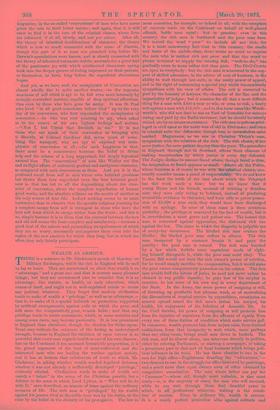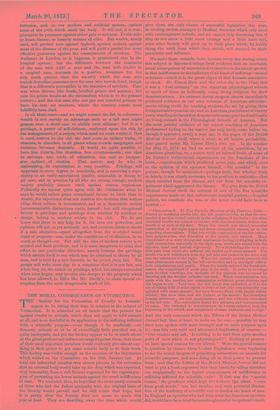WEALTH AS ARMOUR.
ITHERE is a sentence in Mr. Gladstone's speech of Monday, on Military Exchanges, which the rich in England will do well to lay to heart. They are accustomed to allow that wealth is an "advantage," and a great one, and that it secures many pleasant things ; but they are accustomed also to consider that it is an advantage, like stature, or health, or early education, which comes of itself, and ought not in well-regulated minds to create any jealousy whatever. They forget that modern civilisation tends to make of wealth a "privilege" as well as an advantage,— that is, to make of it a special bulwark or protection, supported by artificial arrangements, against evils to whieh the poor, and still more the comparatively poor, remain liable ; and that any privilege tends to excite resentment, which, in some societies and among some races, may become passionate. It is less prominent in England than elsewhere, though the election for Stoke-upon- Trent may indicate the existence of the feeling in undeveloped strength, because in England the tradition of open careers is so powerful that every man regards wealth as one of his own chances ; but on the Continent it has assumed formidable proportions, it is the grand argument of the host of semi-cultivated and dis- interested men who are leading the warfare against society, and it has at bottom that substratum of truth to which Mr. Gladstone, in asking whether wealth needed legalised defences, whether it was not already a sufficiently developed "privilege," evidently alluded. Civilisation tends to make of wealth not merely a "talent" in the sense of the Christian parable, but a defence in the sense in which Lord Lytton, in "What will he do with It," once described, an armour of brass against the ordinary menaces of life. The rich man is "privileged" by his wealth against his poorer rival as the noble once was by his status, or the ruler by the belief in the divinity of his prerogative. The law in
most countries, for example, or indeed in all, with the exception of reserves made on the Continent on behalf of well-placed officials, holds men equal ; but in practice, even in this country,' the rich man is bucklered and the poor man bare. We intend the word " poor " to include all not rich, for it is a most noteworthy faet-that in this country, the cradle and home of the middle-class, there-exists no word -to express the man who is -neither rich- not peor; and that the word or phrase invested to supply the linissing link, "Well-to-do," has gradually Come to meat 'rather Heti than poor. The Civil Courts are open to everybody ;" but the rich man is armoured in- the sup- port of'skilled advocates,-in- the advice of men of business), in the ability to Wait through lawsuits, in the costly pOwer'of and in the right-of summoning a:special jury which tinconstionsly seimpathises with his 'view Of affairs. The evil is corrected •in part by- the honesty' of lawyers; the character of the Bar, and the impartiality of judges ; but it remains -forall that a Most 'difficult -thing for a man with 1400 a 'year to 'win, or even --tO -risk abeavy suit against a man with £10,000; and to this hour cattesliketWads- worth's, whoilidnotidare to'sne an Earl of Lonsdideilfclikatineys owing, and paid by the'EatNisuceessor, lest he'slibuldbeflitterly railed, are by no meartaimetiMinnn:., The richman isiAnitteas-privi- leged in civil cases as the tobleVii of okLin libel caSeavoidexen in'crimintil Suits the'differelitieklitimghlees; is neverthisitha *nest markeff. 7)3 MittiattatreiW 41131814 4lielyr-in'OblristiarliriNiable, 'case, symPtitlifice with the relatiies --Of the rielti Obtain, if not more justice, far moke patient inquiry tin:tit:tile piriee.oTheproceclure in England, through itoVid Scotland; kliiwitrefeift thldneWof making compromises by- 'obi& jastio= eitgfy ,dardefeated. The judges declineto aseunielmud wherellhghfrand is Clear, the temptation to fraud appears soaniall. Above Pollee, whose-business is Of course tdiwar With-the miittinal"clatises, dm- stantly- consider means a proof of reepeetabflity-Z)We do not know in the least the truth of the case about which the Telegraph has this week made a fuss ; but we do know that if yOttn Hyam and his friends; acetised of robbing-: a drunken man they were only trying to befriend, instead of prodtming irresistible 'evidence to character, had been able to prove posses- sion of 15,00 a- year each, they would have been discharged -
with an apology. In none of these eases is there conscious
partiality ; the privilege is conveyed by the fact of wealth, but it is, nevertheless, a most grave and potent one. The honest rich man is armoured against oppression, the dishonest rich one against the law. The cases in which the disparity is palpable are of every-day occurrence. The libelled rich man crushes the libeller ; the libelled Poor man suffers in silence. The rich man hampered by „ a ebntract breaks it and paYS the penalty ; the poor man is ruined. The rich man worried by a law Which forbids some capricious mode of right- ing himself disregards 'it, While 'the peer Man must- Obey. The Tenure Bill would not limit the rich owner's power of evietron, for he would simply sacrifice the compensation, but it Would Make the poor owner Comparatively powerless on his estates. The rich. manavoids half the labour of juries, he need not serve unless he chooses in any public capacity, be pays less of his surplus in taxation, he has more of his own way in every department- of the State. In the Army, the mere power of resigning at will, of throwing up profitable but irksome work, or of neutralizing the discomforts of tropical service by expenditure, constitutes an armour spread round the rich man's status, his temper* his health, his enjoyment of the felicities of domestic life., In the , Civil Service, his power of resigning at will protects him from the injustice of superiors, from the affronts of equals-, from every one of those fixities of condition which make servide In commerce, wealth protects him from unjust snits, from hurried realisations, from that incapacity to wait which, more perhaps than any other cause, brings small men down in bushels. The rich man, and he almost alone, can intervene directly in politics, either by entering Parliament, or starting a newspaper, or taking a prominent part in that sort of local business which brings poli- tical influence in its train. He has three chances to one in. the race for high office—Englishmen dreading the " adVenturer;"— two chances to one in the struggle for office bestowed by patronage, and a much more than equal chance even of office obtained by competitive examination. The man whose father can pay the "Crammer "—whose aid, though most valuable, is also most costly—is, in the majority of cases, the man who will succeed, while he can wait through those first dreadful years in which, in all professions whatever, waiting is the condi- tion of success. Even in ordinary life, wealth is armour. It is a nearly perfect protection alike against solitude and intrusion, and, , in our modern and artificial system, against most of the evils which assail the body.. It will not, it is true, guarantee its possessor; against either pain or sickness. -Tooth-ache 'or heart-diseasasos• insanity menace all alike. But wealth, wisely used, will protect men against typhoid, against malaria, against most of the diseases taf the poor, and will yield a partial but most effective guarantee against the consequences of accident. The workman in -London, as it happens, ia guaranteed also by the hospital system ; but the difference between the treatment of the man with 14Q0 a year and. the man with 14,000 in
surgical case, amounts to a-- positive insurance for the
rich much greater than the security which the man who 'travels first-clasa possesses over the man who travels third, though that is a difference perceptible in the statistics of accident. Time was when disease, like death, levelled prince and peasant; but now the prince laughs atsthe rheumatism which is to the peasant torture; and the rich man who can pay one hundred guineas to have. 1114t1 arms slot recovers, where' the country curate must infallilksha,va
In allsthgaasamses--and we might extend the list to, columns-
swealtlisissnotasegrely an. advantage such as a tall man might possess, oyez: short%one, oe, ability over, silliness ; but it is a priiWageslkspower .afbaelisslakness ,conferred upon the rich by The MIIIPgalnents ofaioetiOlataiWilials)PeRd nO- more 0914ffsit it-nee4sYnSgrv.M.O.Sa4a raCh sthe 4insts43eats, iP. xad-iftlY thetst441A14 Anrcilsts, issId1 :Igaoes,whoro crowds W1104'44.40 .,s-bsolatioporbsecanseg sdesisishless, It would be quite possibk,tsi sdiayasfsep Pasaartasfsm gisnishes, free entertainments ; onek elatis Scinsssallwnssi, )(mar, isseclgogi education, one and an in- -. That society may be /dap in tts organisation is very passible. l'rivilege, will appertaialome degree to somebedy, and in se.servieg tt,aupe-
riority to seasily-ascertained quality, obtainable in theory by
all men, and in practice by all who are strong enough, modern 'society probably insures itself against serious explosions. Politically we cannot quite agree with Mr. Gladstone when he nays he wouldrather grant exceptional favour to birth than to -wealth; for experience does not confirm the doctrine that noblesse oblige when noblesse is uncontested, and in a democratic society incommunicable distinctions excite hatred ; but still exceptional 'favour is privilege, and privilege does, whether by accident or
• design, belong in modern society to the rich. We do not
-know that there is any help for it, for laws are powerless, and :opinion will not as yet seriously act, and cautious thinkers doubt if a safe alteration—apart altogether from the so-styled moral right of property—can, under the conditions of civilisation, be so much as thought-out. But still the idea of modern society is to control and limit privilege, and it is most dangerous to relax that effort in one particular direction, merely because the privilege which asserts itself is one which may be obtained in theory by all men, and is held by a new fosmula to be prima facie fair. The people will wake some day to a suspicion that it is not fair, and when they do, the attack on privilege, which has always succeeded when once begun, may involve also danger to the property which -has been allowed, in Bill s like Mr. Ilardy?s, to claim special ex- emption from the more disagreeable work of life.



































 Previous page
Previous page